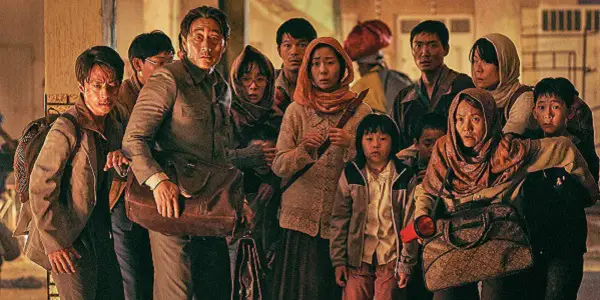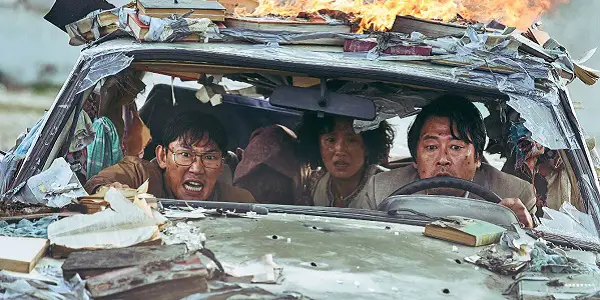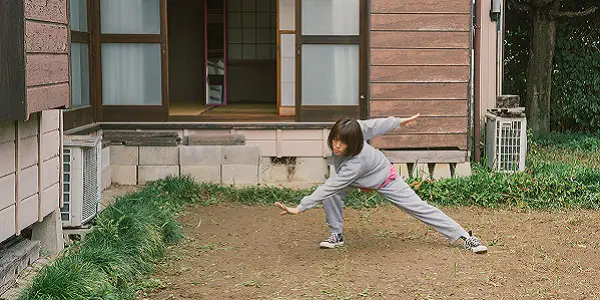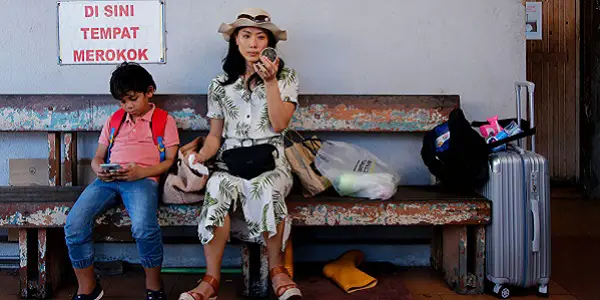New York Asian Film Festival 2021 Part One: ESCAPE FROM MOGADISHU, NINJA GIRL and BARBARIAN INVASION

Lee Jutton has directed short films starring a killer toaster,…
The 2021 New York Asian Film Festival, presented by the New York Asian Film Foundation and Film at Lincoln Center, kicks off Friday, August 6 with an extensive slate of in-person and virtual screenings of films from across the continent. If there is one, and literally only one, good thing to come out of the COVID-19 pandemic, it is that festivals like this one are now making select screenings available to people who would otherwise never be able to attend in person. Legendary Hong Kong filmmaker Ann Hui (The Story of Woo Viet, Boat People) will be receiving this year’s Variety Lifetime Achievement Award, while six films from first- or second-time directors will be competing for the Uncaged Award for Best Feature Film.
Below are some highlights from this year’s NYAFF line-up, including an adrenaline-pumping South Korean thriller, a quirky Japanese dark comedy about fighting xenophobia, and an introspective look at motherhood and moviemaking from one of the Malaysian New Wave’s most intriguing talents. Check them out, and keep an eye out for more recommendations of highlights from this year’s festival from yours truly.
Escape from Mogadishu (Ryoo Seung-wan)
The opening film of the 2021 NYAFF is a doozy of an action flick that is celebrating its international premiere at the festival. Directed by Ryoo Seung-wan, Escape from Mogadishu is based on real events that occurred during the Somali Civil War in the early 1990s when the diplomats at the North and South Korean embassies were forced to put their enmity aside and come together in order to escape the violence engulfing the country. The film combines the international intrigue of a John le Carré thriller with some intense chase sequences that would be right at home in a Mad Max movie to paint a blood-spattered portrait of how the horrors of war impact those adjacent to the main conflict.
In the late 1980s and early 1990s, South Korea was campaigning to join the United Nations. With African nations holding a critical number of votes, diplomacy on the ground was key to achieving their goal. The film opens with the arrival of South Korean counselor Kang Dae-jin (Jo In-sung) in Somalia to join a small embassy populated by a mere handful of diplomats, led by Ambassador Han Sin-seong (Kim Yoon-seok). An overly confident intelligence officer who is fond of boasting about his training, Kang quickly learns that diplomacy in the country involves dealing with not only corrupt Somalian government officials and gangs of anti-government rebels but the clever sabotage and subterfuge of the North Korean diplomats, led by Ambassador Rim Yong-su (Heo Joon-ho).

However, all hopes of securing UN votes are abruptly pushed aside when the people of Somalia rise up against the government. Ryoo does not hold back in portraying the bloody street battles between ordinary citizens and the government-backed police, including showing us characters being beaten to death by police and executed by firing squad. These sequences are horrifyingly brutal, but necessary if one’s goal is to portray the realities of these conflicts. However, one does wish that the film’s supporting Somalian characters had more to do than either inflict violence or become victims of it (or both). Escape from Mogadishu is, at its core, a story about Koreans coming together when caught in the middle of a conflict, not the conflict itself; nonetheless, the use of such a conflict as a background for a story about people on the outskirts of it might raise some eyebrows if it were not for the fact that it is indeed based on true events. (To be fair, it may still do so.)
When a group of rebels takes over the North Korean embassy, Ambassador Rim and the rest of the diplomatic personnel—including multiple small children—are forced out into the night. The North Koreans essentially run a gauntlet of terror in the hope of seeking refuge at the Chinese embassy. In one particularly intense scene, they encounter a trio of Somalian children armed with machine guns who are play-acting at shooting them down. The North Korean children immediately play along, dropping to the ground as though they are dead; the confused adults gradually follow, willing to do whatever it takes to survive. The North Koreans end up begging for mercy at the gates of the South Korean embassy, and despite Kang’s immediate distrust of their request, Ambassador Han’s empathy wins out.

As the North and South Koreans seek an evacuation route via one of their international allies, Escape from Mogadishu culminates in an epic car chase that may as well have been directed by George Miller, the battered and bullet-ridden embassy cars careening through the nearly-abandoned streets of Mogadishu with rebel soldiers hot on their tails. (The film was shot on location in Morocco, as Somalia is currently on South Korea’s no-fly list, and fortunately without any of that sickly yellow filter that Hollywood loves to use when portraying the Global South. Here, even amidst the violence, there are blue skies.) Yet while this incredibly exciting and expertly executed sequence is definitely one of the highlights of the film, it’s the quieter moments, such as the Koreans coming together over a meal, and Ambassador Han sharing rice with Ambassador Rim to assure the North Koreans it is not poisoned, that have the biggest impact on the audience. The smallest gestures of solidarity between the two groups of people, such as using one’s chopsticks to hold down part of a side dish so that a fellow diner can more easily grab a piece for themselves, have such a weighty cultural history behind them that it is hard to not be moved.
The film’s surprisingly frequent flashes of humor are also a huge asset, lightening up proceedings when absolutely necessary and ensuring the characters’ humanity remains front and center. With stellar performances from everyone involved, especially Kim and Heo as the rival ambassadors turned temporary allies, it’s easy to become wholly engaged by a blockbuster like Escape from Mogadishu.
Ninja Girl (Yû Irie)
A strange little film from Japanese director Yû Irie with a delightful central performance from Saki Fukuda, Ninja Girl chronicles the coming-of-age of one quiet young woman as she summons all of her strength to fight for what’s right. Miu (Fukuda) lives on the outskirts of the small, drab town of Fukuya City with her elderly grandfather, Goro (Shôhei Uno), a former crusading journalist who has lost none of his fire even as he remains mostly confined to his bed. Goro has been loudly opposing a racist ordinance pushed by the corrupt local government that seeks to expel all immigrants from Fukuya City. This makes things awkward for Miu, who works in city hall and is increasingly isolated by her colleagues due to her grandfather’s position; her only ally at work is Koji Mano (Arata Iura), a close family friend who went to school with her now-absent father.

After Koji is coerced into falsifying documents in favor of the ordinance, he is so ashamed of what he feels is the total betrayal of his values as a civil servant that he commits suicide by jumping from the roof of the city hall. Devastated by the loss, Goro reveals to Miu that their family is descended from a long line of ninjas, and gives her a mission to fulfill: track down the recording of the meeting in which Koji was told to falsify documents so that they can use it to reveal the ugliness of the government’s true face to everyone.
While Miu’s first impulse when being told about her ninja heritage is to fetch Goro’s meds, she quickly embraces the assignment, even going so far as to go shopping for fabric in which to make a proper ninja costume. (Despite her flamboyantly dressed best friend’s insistence that she purchase something pretty, pink, and patterned, Miu goes for the standard black.) Teaching herself to use homemade blow-darts and throwing herself into her calisthenics with gusto, what Miu lacks in finesse she makes up for in spirit. But the government’s gang of brutal thugs in lime green windbreakers (a visual signifier that couldn’t help but remind me of red MAGA hats) will stop at nothing to destroy any further opposition to their racist ordinance—including breaking and entering, intimidation, and beatings.

For a film that focuses on such a serious topic, Ninja Girl is a hell of a lot of fun, shining with an eccentric sense of humor while also highlighting the all-too-real importance of fighting back against bigotry. The film ensures that the absurdity inherent in Miu’s situation shines through in every scene; I laughed out loud when Miu attempted to open what she thought was a box holding family ninja secrets and Goro abruptly stopped her: “Don’t open those—they’re books I bought on Amazon.” Miu’s evolution from an awkward girl whose heavy bangs and hunched shoulders perpetually signify a desire to hide into a tough, vengeful vigilante is super enjoyable and believable courtesy of Fukuda’s performance. Amidst her secret ninja quest, she also struggles with romantic entanglements and accusations of betrayal, reminding us that even as she sneaks around the leafy suburbs in her homemade ninja costume, she’s still a regular young woman.
Ninja Girl is composed of many compelling shots; the town of Fukuya City is often shown as washed-out and borderline dystopic, all drab greys and greens, and the characters often appear small and almost insignificant in the wide, empty landscape, highlighting the uncaring nature of the place. The film’s bright, bouncy techno score—most prominent in the scenes in which Miu is exercising and polishing her ninja skills—perfectly suits Ninja Girl’s quirky tone, reminding one of old kung-fu movies and arcade games. Overall, it’s an absolutely remarkable movie that will entertain and inspire in equal measure.
Barbarian Invasion (Tan Chui Mui)
Malaysian New Wave director Tan Chui Mui has previously acted in several productions but never before has she appeared in one of her own movies. The film in question, Barbarian Invasion, is clearly a very personal endeavor and represents her unique, important vision as a Southeast Asian woman filmmaker. Tan stars as Moon Lee, a retired award-winning actress who has just gone through a high-profile divorce from her husband, a fellow star of Southeast Asian cinema. Looking to regain her own identity post-marriage and motherhood, Moon decides to link up with her longtime collaborator, director Roger Woo (Pete Teo), for a comeback film.

Despite her initial hesitancy, Moon is convinced by Roger to not only star in what he describes as a Southeast Asian version of The Bourne Identity—a woman fluent in many languages washes up on the beach with no memory of her past as a badass spy—but to undergo months of martial-arts training so she can perform all of her own stunts. As Moon tells Roger’s assistant, she hates being told her son is her greatest work; it implies that all she was ever fit for was to funnel another person into the world. With this film, Moon has a chance to regain control over her body, and to exist as something more than a mother, both onscreen and off.
In order to master the skills necessary to be a believable martial artist, Moon will have to let go of all of the mental baggage in her past; as a monk enigmatically tells her, “Your body is not the prison of your mind, your mind is the prison of your body.” But it’s hard to forget the past when your director informs you that your ex-husband is the only male co-star whose box office draw is enough to get the film financed. Soon, the lines between Moon’s real life and that of her character become increasingly blurred, until it’s difficult for her and the audience alike to determine the difference between the two.

As Roger aptly notes towards the beginning of Barbarian Invasion, “When I was young, film was everything. Now that I’m this age, everything is film. Life is a film.” (Moon quips in reply, “Are we making a Hong Sang-soo film?” and yes, I laughed.) Indeed, Barbarian Invasion feels like an authentic behind-the-scenes documentary of an actress’s much-anticipated comeback; it’s all too easy to forget that Tan and Moon are not the same people, just as Moon and her character in Roger’s film are not the same people. (Or are they?) As both director and star, Tan carries every aspect of the production and does so with great skill and feeling, capturing the singular difficulties of being a woman in the spotlight and not knowing where the real you ends and the work begins. The film’s remote setting—a small Malaysian fishing town — and Gwai Lou’s easygoing, unshowy cinematography only add to the intimate feel that pervades the entire film. Barbarian Invasion is occasionally confusing, but it’s never boring.
Conclusion
The above are only three of the dozens of films screening at the 20th edition of the New York Asian Film Festival, but if the rest of the slate is as high-quality as these, festivalgoers will be in for a treat.
What do you think? Which of these films sounds most appealing to you? Share your thoughts in the comments below.
The 2021 New York Asian Film Festival runs from August 6-22, 2021. You can find a complete list of virtual and in-person screenings here.
Does content like this matter to you?
Become a Member and support film journalism. Unlock access to all of Film Inquiry`s great articles. Join a community of like-minded readers who are passionate about cinema - get access to our private members Network, give back to independent filmmakers, and more.
Lee Jutton has directed short films starring a killer toaster, a killer Christmas tree, and a not-killer leopard. Her writing has appeared in publications such as Film School Rejects, Bitch: A Feminist Response to Pop Culture, Bitch Flicks, TV Fanatic, and Just Press Play. When not watching, making, or writing about films, she can usually be found on Twitter obsessing over soccer, BTS, and her cat.













